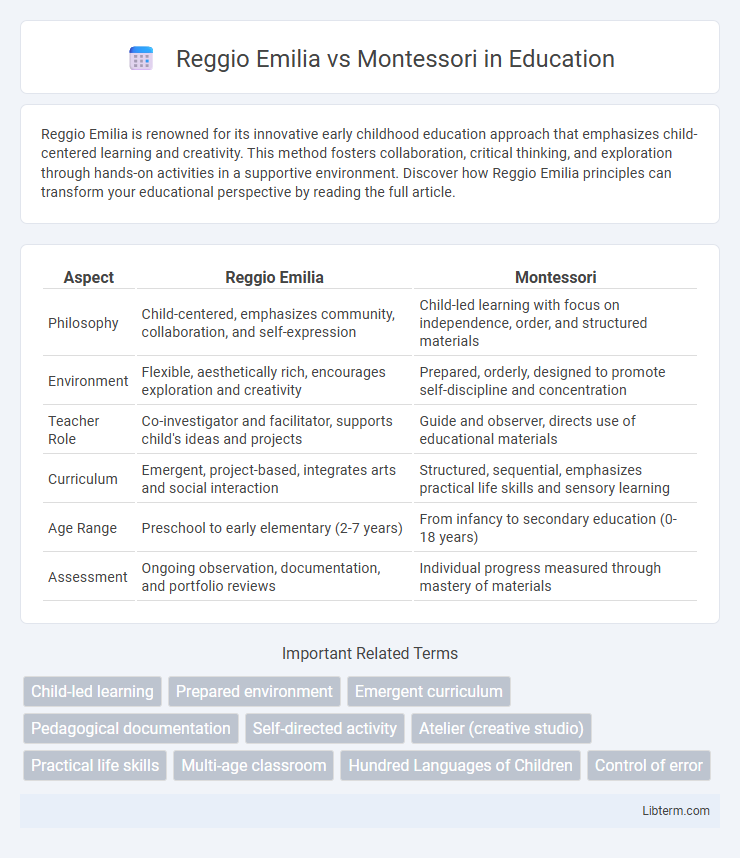Reggio Emilia is renowned for its innovative early childhood education approach that emphasizes child-centered learning and creativity. This method fosters collaboration, critical thinking, and exploration through hands-on activities in a supportive environment. Discover how Reggio Emilia principles can transform your educational perspective by reading the full article.
Table of Comparison
| Aspect | Reggio Emilia | Montessori |
|---|---|---|
| Philosophy | Child-centered, emphasizes community, collaboration, and self-expression | Child-led learning with focus on independence, order, and structured materials |
| Environment | Flexible, aesthetically rich, encourages exploration and creativity | Prepared, orderly, designed to promote self-discipline and concentration |
| Teacher Role | Co-investigator and facilitator, supports child's ideas and projects | Guide and observer, directs use of educational materials |
| Curriculum | Emergent, project-based, integrates arts and social interaction | Structured, sequential, emphasizes practical life skills and sensory learning |
| Age Range | Preschool to early elementary (2-7 years) | From infancy to secondary education (0-18 years) |
| Assessment | Ongoing observation, documentation, and portfolio reviews | Individual progress measured through mastery of materials |
Introduction to Reggio Emilia and Montessori Approaches
The Reggio Emilia approach centers on child-led exploration, emphasizing collaboration, creativity, and experiential learning in a nurturing environment. Montessori education promotes independence through structured activities, self-directed learning, and hands-on materials designed to develop practical skills and cognitive growth. Both approaches prioritize respect for the child's natural development but differ in methodology and classroom structure.
Historical Background and Philosophical Foundations
Reggio Emilia originated in post-World War II Italy, emphasizing child-centered, community-driven education inspired by Loris Malaguzzi's belief in children as competent learners. Montessori, developed by Dr. Maria Montessori in early 20th-century Italy, centers on independence, sensory-based learning, and self-directed activity within a prepared environment. Both approaches share progressive educational goals but differ philosophically; Reggio Emilia prioritizes social collaboration and expression, while Montessori focuses on individualized, hands-on learning.
Core Principles and Educational Goals
Reggio Emilia emphasizes child-led exploration, creativity, and collaborative learning, fostering a strong sense of community and self-expression through project-based activities. Montessori centers on independence, hands-on learning, and structured environments that encourage mastery of practical skills and cognitive development at the child's own pace. Both approaches prioritize respect for the child's abilities but differ in methods: Reggio Emilia nurtures social interaction and emergent curriculum, while Montessori relies on individual work with specialized educational materials.
Classroom Environment and Learning Materials
The Reggio Emilia approach emphasizes a dynamic classroom environment designed as the "third teacher," featuring natural elements, open spaces, and flexible layouts to encourage exploration and collaboration. Montessori classrooms prioritize order, simplicity, and accessibility, with carefully curated learning materials aimed at fostering independence and self-paced learning. Both environments utilize hands-on materials, but Reggio Emilia focuses on creativity and social interaction, while Montessori centers on structured, sensory-based activities.
Role of the Teacher and Adult Involvement
In Reggio Emilia, teachers act as co-learners and collaborators, facilitating inquiry and supporting children's exploration through observation and documentation. Montessori educators serve more as guides who prepare structured environments, allowing children to independently engage with materials and develop self-discipline. Adult involvement in Reggio Emilia emphasizes relational engagement and responsive interaction, whereas Montessori focuses on fostering autonomy with minimal but purposeful intervention.
Child’s Role in the Learning Process
The Reggio Emilia approach emphasizes the child as a co-constructor of knowledge, encouraging exploration and collaboration through a dynamic learning environment. Montessori education fosters independence by allowing children to choose activities that match their interests and developmental stages, promoting self-directed learning. Both methods prioritize the child's active engagement but differ in structure and guidance levels, with Reggio Emilia focusing on social interaction and Montessori on individual autonomy.
Curriculum Design and Daily Activities
Reggio Emilia's curriculum design emphasizes child-led projects and experiential learning, encouraging exploration and collaboration through flexible, emergent activities. Montessori's approach features a structured curriculum with predefined materials and sequential tasks, fostering independence and self-discipline through individualized learning plans. Daily activities in Reggio Emilia settings often center around creative arts and community engagement, while Montessori classrooms focus on practical life skills, sensory exploration, and academic exercises.
Assessment and Documentation Practices
Reggio Emilia emphasizes qualitative assessment through continuous, detailed documentation including photographs, child portfolios, and narrative observations that capture children's learning processes and social interactions. Montessori relies on ongoing, individualized observations and record-keeping by teachers to monitor skill mastery and developmental progress without formal testing. Both approaches prioritize child-centered documentation to inform instruction, yet Reggio Emilia uniquely engages parents and community in reflective dialogue based on the documented learning experiences.
Parental Involvement and Community Engagement
Reggio Emilia emphasizes strong parental involvement by encouraging parents to actively participate in their child's learning environment and school activities, fostering a collaborative community atmosphere. Montessori also values family engagement but focuses more on individualized learning plans that parents support at home, reinforcing independence and self-discipline. Community engagement in Reggio Emilia is integrated through project-based learning with local culture and resources, while Montessori schools often create community connections through service activities and partnerships that enhance practical life skills.
Choosing the Right Approach: Factors to Consider
Choosing between Reggio Emilia and Montessori approaches involves evaluating your child's learning style, as Reggio Emilia emphasizes collaborative, project-based exploration while Montessori fosters independent, hands-on learning through structured activities. Consider the educational environment and teacher roles; Reggio Emilia classrooms are dynamic and child-led with teachers as co-learners, whereas Montessori settings provide individualized instruction with a focus on self-discipline and order. Family values and goals for social development also influence this choice, as Reggio Emilia promotes strong community involvement and expression, while Montessori prioritizes autonomy and practical life skills.
Reggio Emilia Infographic

 libterm.com
libterm.com